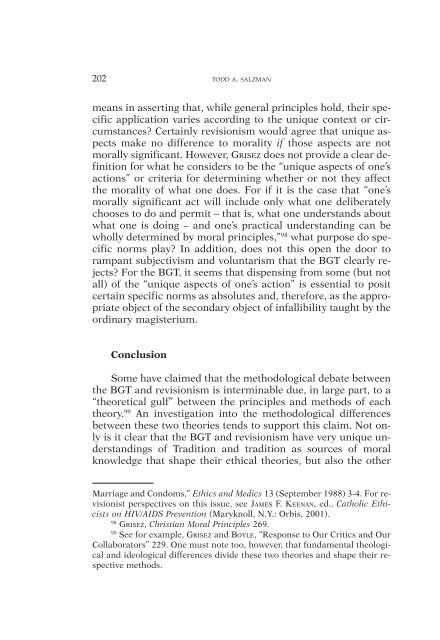Avant-propos - Studia Moralia
Avant-propos - Studia Moralia
Avant-propos - Studia Moralia
You also want an ePaper? Increase the reach of your titles
YUMPU automatically turns print PDFs into web optimized ePapers that Google loves.
202 TODD A. SALZMAN<br />
means in asserting that, while general principles hold, their specific<br />
application varies according to the unique context or circumstances?<br />
Certainly revisionism would agree that unique aspects<br />
make no difference to morality if those aspects are not<br />
morally significant. However, GRISEZ does not provide a clear definition<br />
for what he considers to be the “unique aspects of one’s<br />
actions” or criteria for determining whether or not they affect<br />
the morality of what one does. For if it is the case that “one’s<br />
morally significant act will include only what one deliberately<br />
chooses to do and permit – that is, what one understands about<br />
what one is doing – and one’s practical understanding can be<br />
wholly determined by moral principles,” 98 what purpose do specific<br />
norms play? In addition, does not this open the door to<br />
rampant subjectivism and voluntarism that the BGT clearly rejects?<br />
For the BGT, it seems that dispensing from some (but not<br />
all) of the “unique aspects of one’s action” is essential to posit<br />
certain specific norms as absolutes and, therefore, as the appropriate<br />
object of the secondary object of infallibility taught by the<br />
ordinary magisterium.<br />
Conclusion<br />
Some have claimed that the methodological debate between<br />
the BGT and revisionism is interminable due, in large part, to a<br />
“theoretical gulf” between the principles and methods of each<br />
theory. 99 An investigation into the methodological differences<br />
between these two theories tends to support this claim. Not only<br />
is it clear that the BGT and revisionism have very unique understandings<br />
of Tradition and tradition as sources of moral<br />
knowledge that shape their ethical theories, but also the other<br />
Marriage and Condoms,” Ethics and Medics 13 (September 1988) 3-4. For revisionist<br />
perspectives on this issue, see JAMES F. KEENAN, ed., Catholic Ethicists<br />
on HIV/AIDS Prevention (Maryknoll, N.Y.: Orbis, 2001).<br />
98 GRISEZ, Christian Moral Principles 269.<br />
99 See for example, GRISEZ and BOYLE, “Response to Our Critics and Our<br />
Collaborators” 229. One must note too, however, that fundamental theological<br />
and ideological differences divide these two theories and shape their respective<br />
methods.

















